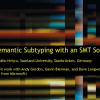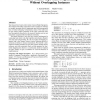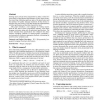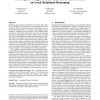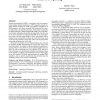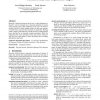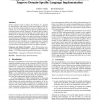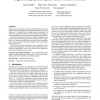ICFP
2010
ACM
15 years 3 months ago
2010
ACM
108
click to vote
ICFP
2010
ACM
15 years 3 months ago
2010
ACM
Type classes have found a wide variety of uses in Haskell programs, from simple overloading of operators (such as equality or ordering) to complex invariants used to implement typ...
ICFP
2010
ACM
15 years 3 months ago
2010
ACM
110
click to vote
ICFP
2010
ACM
15 years 3 months ago
2010
ACM
Existing macro systems force programmers to make a choice between clarity of specification and robustness. If they choose clarity, they must forgo validating significant parts of ...
115
click to vote
ICFP
2010
ACM
15 years 3 months ago
2010
ACM
Reasoning about program equivalence is one of the oldest problems in semantics. In recent years, useful techniques have been developed, based on bisimulations and logical relation...
125
click to vote
ICFP
2010
ACM
15 years 3 months ago
2010
ACM
Nested data-parallelism (NDP) is a declarative style for programming irregular parallel applications. NDP languages provide language features favoring the NDP style, efficient com...
ICFP
2010
ACM
15 years 3 months ago
2010
ACM
The leading implementations of graph reduction all target conventional processors designed for low-level imperative execution. In this paper, we present a processor specially desi...
123
click to vote
ICFP
2010
ACM
15 years 3 months ago
2010
ACM
' abstraction theorem shows how a typing judgement in System F can be translated into a relational statement (in second order predicate logic) about inhabitants of the type. ...
139
click to vote
ICFP
2010
ACM
15 years 3 months ago
2010
ACM
Partial evaluation aims to improve the efficiency of a program by specialising it with respect to some known inputs. In this paper, we show that partial evaluation can be an effec...
115
click to vote
ICFP
2010
ACM
15 years 3 months ago
2010
ACM
We present a novel approach to regular, multi-dimensional arrays in Haskell. The main highlights of our approach are that it (1) is purely functional, (2) supports reuse through s...
